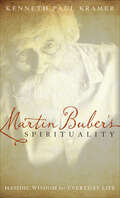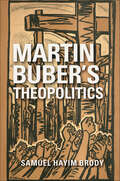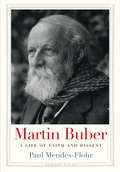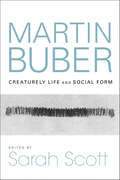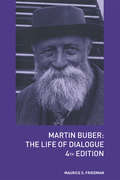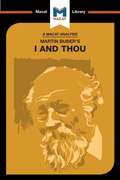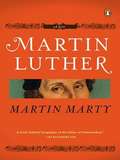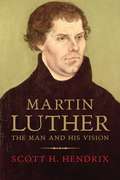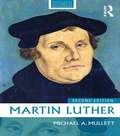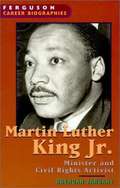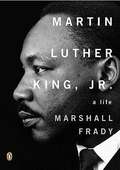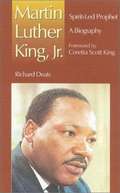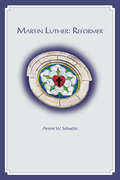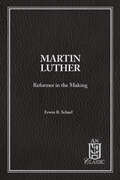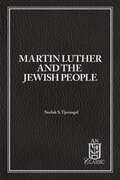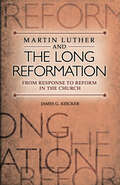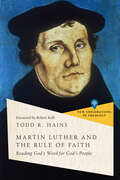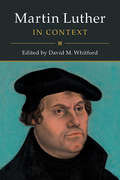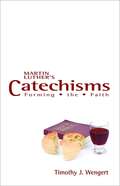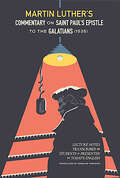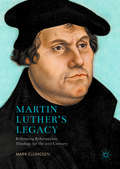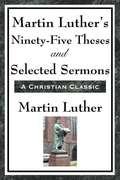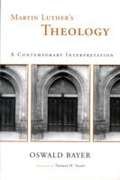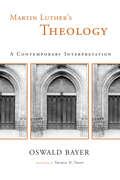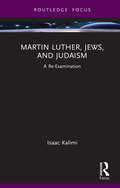- Table View
- List View
Martin Buber's Spirituality: Hasidic Wisdom for Everyday Life
by Kenneth Paul KramerHow do we find meaning in our life? This book explores how Martin Buber, one of the 20th century’s greatest religious thinkers, answers this timeless question. Author Kenneth Paul Kramer explains Buber’s Hasidic spirituality—a living connection between the human and the divine—and how it is relevant to all spiritual seekers. According to Buber, we find meaning in life through wholeheartedly “letting God in." He developed this theme through six thought-provoking talks originally published as The Way of Man. In Martin Buber’s Spirituality, Kramer explains the accessible practices Buber outlined in these talks, shares the stories Buber used to illustrate each point, and explores how these teachings might apply in everyday life today. The book features questions for personal or group reflection to help readers more fully explore Martin Buber’s approach to spirituality, along with a glossary of key terms.
Martin Buber's Theopolitics (New Jewish Philosophy and Thought)
by Samuel Hayim BrodyHow did one of the greatest Jewish thinkers of the 20th century grapple with the founding of Israel and the Israeli-Palestinian conflict—one of the most significant political conflicts of his time? Samuel Hayim Brody traces the development of Martin Buber's thinking and its implications for the Jewish religion, for the problems posed by Zionism, and for the Zionist-Arab conflict. Beginning in turbulent Weimar Germany, Brody shows how Buber's debates about Biblical meanings had concrete political consequences for anarchists, socialists, Zionists, Nazis, British, and Palestinians alike. Brody further reveals how Buber's passionate commitment to the rule of God absent an intermediary came into conflict in the face of a Zionist movement in danger of repeating ancient mistakes. Brody argues that Buber's support for Israel stemmed from a radically rich and complex understanding of the nature of the Jewish mission on earth that arose from an anarchist reading of the Bible.
Martin Buber: A Life of Faith and Dissent (Jewish Lives #83)
by Paul Mendes-FlohrThe first major biography in English in over thirty years of the seminal modern Jewish thinker Martin Buber An authority on the twentieth‑century philosopher Martin Buber (1878–1965), Paul Mendes-Flohr offers the first major biography in English in thirty years of this seminal modern Jewish thinker. The book is organized around several key moments, such as his sudden abandonment by his mother when he was a child of three, a foundational trauma that, Mendes-Flohr shows, left an enduring mark on Buber’s inner life, attuning him to the fragility of human relations and the need to nurture them with what he would call a “dialogical attentiveness.” Buber’s philosophical and theological writings, most famously I and Thou, made significant contributions to religious and Jewish thought, philosophical anthropology, biblical studies, political theory, and Zionism. In this accessible new biography, Mendes-Flohr situates Buber’s life and legacy in the intellectual and cultural life of German Jewry as well as in the broader European intellectual life of the first half of the twentieth century.
Martin Buber: Creaturely Life and Social Form (New Jewish Philosophy and Thought)
by Sarah ScottA new collection of essays highlighting the wide range of Buber's thought, career, and activism. Best known for I and Thou, which laid out his distinction between dialogic and monologic relations, Martin Buber (1878–1965) was also an anthologist, translator, and author of some seven hundred books and papers. Martin Buber: Creaturely Life and Social Form, edited by Sarah Scott, is a collection of nine essays that explore his thought and career.Martin Buber: Creaturely Life and Social Form shakes up the legend of Buber by decentering the importance of the I-Thou dialogue in order to highlight Buber as a thinker preoccupied by the image of relationship as a guide to spiritual, social, and political change. The result is a different Buber than has hitherto been portrayed, one that is characterized primarily by aesthetics and politics rather than by epistemology or theology. Martin Buber: Creaturely Life and Social Form will serve as a guide to the entirety of Buber's thinking, career, and activism, placing his work in context and showing both the evolution of his thought and the extent to which he remained driven by a persistent set of concerns.
Martin Buber: The Life of Dialogue (Martin Buber)
by Maurice S. FriedmanMartin Buber: The Life of Dialogue, the first study in any language to provide a complete overview of Buber's thought, remains the definitive guide to the full range of his work and the starting point for all modern Buber scholarship. Maurice S. Friedman reveals the implications of Buber's thought for theory of knowledge, education, philosophy, myth, history and Judaic and Christian belief.This fully revised and expanded fourth edition includes a new preface by the author, an expanded bibliography incorporating new Buber scholarship, and two new appendices in the form of essays on Buber's influence on Emmanuel Levinas and Mikhail Bakhtin.
Martin Buber’s I and Thou (The Macat Library)
by Simon RavenscroftMartin Buber’s I and Thou argues that humans engage with the world in two ways. One is with the attitude of an ‘I’ towards an ‘It’, where the self stands apart from objects as items of experience or use. The other is with the attitude of an ‘I’ towards a ‘Thou’, where the self enters into real relation with other people, or nature, or God. Addressing modern technological society, Buber claims that while the ‘I-It’ attitude is necessary for existence, human life finds its meaning in personal relationships of the ‘I-Thou’ sort. I and Thou is Buber’s masterpiece, the basis of his religious philosophy of dialogue, and among the most influential studies of the human condition in the 20th century.
Martin Luther
by Martin MartyThis new series examines the lives of people who have had a major impact on the history or current practice of religion. Individuals profiled include clergy of diverse faiths as well as lay people who have had a profound intellectual influence on religious and philosophical thought. When Martin Luther nailed his Ninety-five Theses demanding Church reforms to the church door at Wittenberg in 1517, he had no idea he was starting a revolution. His ideas, however, took hold of Europe and helped split the Catholic Church into the many Christian denominations that exist around the world today.
Martin Luther
by Scott H. HendrixThe sixteenth-century German friar whose public conflict with the medieval Roman Church triggered the Protestant Reformation, Martin Luther was neither an unblemished saint nor a single-minded religious zealot according to this provocative new biography by Scott Hendrix. The author presents Luther as a man of his time: a highly educated scholar and teacher and a gifted yet flawed human being driven by an optimistic yet ultimately unrealized vision of "true religion. " This bold, insightful account of the life of Martin Luther provides a new perspective on one of the most important religious figures in history, focusing on Luther's entire life, his personal relationships and political motivations, rather than on his theology alone. Relying on the latest research and quoting extensively from Luther's correspondence, Hendrix paints a richly detailed portrait of an extraordinary man who, while devout and courageous, had a dark side as well. No recent biography in English explores as fully the life and work of Martin Luther long before and far beyond the controversial posting of his 95 Theses in 1517, an event that will soon be celebrated as the 500th anniversary of the Reformation. "
Martin Luther (Routledge Historical Biographies)
by Michael A. MullettAn engaging and comprehensive new edition of this established biography provides students with an understanding of the European Reformation through the life of its key mover, Martin Luther. Working chronologically through Luther’s life, Michael A. Mullet explains and analyses Luther’s background, the development of his Reformation theology in the 95 Theses, the Diet of Worms and the creation of Lutheranism. This fully revised and updated new edition includes a chapter on the legacy and memory of Luther through the centuries since his death, looking to his influence on modern Germany and the wider world. A comprehensive chronology at the start of the book traces the important dates in Luther’s personal and political life. This is a vivid, scholarly and empathetic biography of Martin Luther, which will be essential reading for all students of the European Reformation, early modern history and religious history.
Martin Luther King Jr.: Minister and Civil Rights Activist (Ferguson Career Biographies)
by Brendan JanuaryThis book focuses on Martin Luther King Jr, looking at his early education and training, the challenges he faced on the job, important mentors and his career achievement.
Martin Luther King, Jr.
by Marshall FradyAn inspiring, uniquely firsthand portrait of the civil rights icon is penned by "one of the best political biographers of our time" ("Los Angeles Times"). Copyright © Libri GmbH. All rights reserved.
Martin Luther King, Jr.: Spirit-Led Prophet
by Richard DeatsMartin Luther King, Jr. was the most inspiring civil rights leader in American history. He was a scholar and a very gifted orator but, before all else, he was a pastor, a theologian, a martyr, a Christian. Spirit-Led Prophet uniquely tells his compelling story from the perspective of his faith. In the midst of a tumultuous public life, King prayed for guidance and depended upon God's spirit to lead him.
Martin Luther Reformer (NPH Classics)
by Armin W Schuetze"What is the impact of Martin Luther and the Protestant Reformation on churches today?Emphasizing the impact of Martin Luther’s teachings and sweeping reform in the 16th century, Martin Luther: Reformer looks at the direct impact of the famous Protestant reformer in today’s Lutheran church. One of Luther’s impacts was to give the Lutheran church an identity by transforming it into a confessional church—though confessing the truths of God’s Word isn’t always easy or well-received.While not wholly chronological, biographical information and quotes of Luther are woven through this informative book to show who Luther was and what he represented.Through this captivating commentary, you can share in the up-and-down battles of a difficult reform, reaffirm your beliefs in God’s Word, and appreciate just what Luther did for the church—both past and present."
Martin Luther Reformer In The Making (NPH Classics)
by Erwin R ScharfWho was Martin Luther and what did he do?Martin Luther: Reformer in the Making provides you with the fascinating background and story of a young, German monk who turned the 16th century world upside-down and sparked the Protestant Reformation.Focusing on Martin Luther’s early life, education, young adult years, and early years as a university professor, this book gives a gripping description of how God used Luther’s life experiences to mold him into Luther the Reformer.If you’re interested in learning more about Martin Luther and his life, this is the book for you!
Martin Luther and the Jewish People (NPH Classics)
by Neelak S TjernagelThis book is a thorough study of Martin Luther and what he wrote about the Jewish people.Martin Luther’s treatment of Jewish people, as well as his writings about them is a subject of frequent but often false portrayals. Martin Luther and the Jewish People takes a close and balanced look at Luther the man—failings and shortcomings and all—the context of his writings, and the times in which he wrote.Originally published in 1985, the author strongly dispels the 20th Century distortions of Luther’s alleged role in modern anti-Semitism. It still applies and is helpful to the 21st Century reader as well.From the author:“It is not strange, therefore, that among Luther’s writings his diatribes against the Jews should be the occasion for offense in the eyes of the contemporary world. We feel no compulsion, however, either to condemn or to condone Luther’s outbursts. But we do have the obligation to try to understand the historical setting, the conventions of his time, and the basic motives and convictions behind what he said and wrote.” –Neelak S. Tjernagel
Martin Luther and the Long Reformation: From Response to Reform in the Church
by James G KieckerThis helpful book gives you the full story of Martin Luther and the Reformation.Have you ever wondered what struggles Martin Luther experienced during the Reformation in the 1500s or how much opposition he faced? What challenges attempted to pull him from his path of teaching God’s Word to the people?Examine the full history of the Reformation in this book: From early attempts at reform in the church, the scope of Luther’s reform, to today’s present challenges in the church.You’ll learn about Luther and the Reformation within the wider historical context—both the history that preceded the 16th century and the centuries that followed the Reformation—all the way to the present!
Martin Luther and the Rule of Faith: Reading God's Word for God's People (New Explorations in Theology)
by Todd R. HainsMartin Luther considered the reading of God's word to be his primary task as a theologian, a pastor, and a Christian.In this New Explorations in Theology (NET) volume, Reformation scholar Todd R. Hains shows that Luther read the Bible according to the rule of faith, which is contained in the church's ancient catechism of the Ten Commandments, the Lord's Prayer, and the Apostles' Creed. Hains carefully examines Luther's sermons to show how Luther taught the rule of faith as the guard and guide of Bible reading.This study will helpfully complicate your view of Luther and bring clarity to your own reading of God's Word.Featuring new monographs with cutting-edge research, New Explorations in Theology provides a platform for constructive, creative work in the areas of systematic, historical, philosophical, biblical, and practical theology.
Martin Luther in Context
by David M. WhitfordMartin Luther remains a popular, oft-quoted, referenced, lauded historical figure. He is often seen as the fulcrum upon which the medieval turned into the modern, the last great medieval or the first great modern; or, he is the Protestant hero, the virulent anti-Semite; the destroyer of Catholic decadence, or the betrayer of the peasant cause. An important but contested figure, he was all of these things. Understanding Luther's context helps us to comprehend how a single man could be so many seemingly contradictory things simultaneously. Martin Luther in Context explores the world around Luther in order to make the man and the Reformation movement more understandable. Written by an international team of leading scholars, it includes over forty short, accessible essays, all specially commissioned for this volume, which reconstruct the life and world of Martin Luther. The volume also contextualizes the scholarship and reception of Luther in the popular mind.
Martin Luther's Catechisms: Forming the Faith
by Timothy J. WengertMartin Luther's catechisms 3 the Small Catechism in 1528-29, and the Large Catechism in spring 1529 responded in part to "the deplorable, wretched deprivation that I recently encountered while I was a visitor" to rural Saxon congregations. The former was for laity, the latter an elaboration largely for the education of clergy, with Luther excoriating "their pure laziness and concern for their bellies." <p><p> Reformation scholar Timothy Wengert has studied Luther's catechisms for the light they shed on the maturing Reformation faith but also for the fascinating lens they afford into the social world of Wittenberg in those years: children, clergy, education and publishing, marriage customs, devotion and prayer, and celebration of the Lord's Supper in this period, along with Luther's own hearty faith, are all illumined by these Western classics. <p><p> In this volume, Wengert follows the traditional catechism order to demonstrate the dynamic faith exhibited in the catechisms in their original context and ours. An ideal resource for college and seminary classes, as well as individual and group reading, this volume will be a valued vehicle for understanding Reformation faith for many years to come.
Martin Luther's Commentary On Saint Paul's Epistle To The Galatians: Lecture Notes Transcribed by Students
by Martin Luther Haroldo CamachoMartin Luther's most comprehensive work on justification by faith, his commentary on St. Paul's Epistle to the Galatians is translated and edited from the Latin into a lively style, paralleling his spoken lectures. Combined with the passion and faith expressed in these lectures, the biblical foundation for the crucial doctrine of justification is underscored and expressed to a new audience. The commentary is also a historical document, a recording of a professor in a classroom in 1531 from July to December of that year, which expresses the Reformer's commitment to the good news of Jesus' death in the sinner's place, challenging the reader/hearer to compare St. Paul's theology with what he/she hears in the church today.
Martin Luther's Legacy
by Mark EllingsenThis volume is a unique interpretation of what Martin Luther contributes to renewed appreciation of Biblical diversity. The Church in the West is struggling. One reason behind this is that the prevailing models for Theology have imposed logical and modern ways of thinking about faith that renders theology academic, and therefore largely irrelevant for daily life. By letting the first Reformer speak for himself in this book, Mark Ellingsen shows how Martin Luther's theological approach can reform the Church's theology today. The real Luther--not the one taught by his various systematic interpreters--presents Christian faith in its entirety, with all its rough edges, in such a way as to direct on how and when to employ those dimensions of the Biblical witness most appropriate for the situation in which we find ourselves.
Martin Luther's Ninety-Five Theses and Selected Sermons
by Martin LutherMartin Luther's Ninety-Five Theses forever changed the world. This is one of Christianity's most important documents. It was not, as most people assume, Luther's explanation as to why he was separating from the Catholic Church, but it was a shot across the bow of a corrupt system that eventually lead to the Reformation. Also included in this edition are seven of Luther's most important sermons including Christ's Holy Sufferings, Enemies of the Cross of Christ & the Christian's Citizenship in Heaven, Christ Our Great High Priest, On Faith & Coming to Christ, Of The Office of Preaching, The Twofold Use of the Law & Gospel: "Letter" & "Spirit," and The Parable of the Sower.
Martin Luther's Theology: A Contemporary Interpretation
by Oswald Bayer Thomas H. TrappIt may come as a surprise to some, but Martin Luther never wrote a "theology." He delivered his theological thought in myriad ways - lectures, preaching notes, arguments, fables, hymns, and more - but never penned a systematic theology. Having scoured Luther's voluminous corpus, Oswald Bayer here reimages Luther's theology and its validity for today. The fruit of Bayer's lifelong engagement with the Reformer, Martin Luther's Theology: A Contemporary Interpretation will serve as the best comprehensive introduction to Luther's thought for a long time. Translated by Thomas H. Trapp.
Martin Luther's Theology: A Contemporary Interpretation
by Oswald BayerForty years of in-depth research on Martin Luther's theology uniquely qualifies Oswald Bayer to present this comprehensive introduction to Luther's thought, written for those lacking an academic background in theology.Bayer's noteworthy study explores the basics of Luther's understanding of theology, discussing his response to the &“philosophy of science&” tradition, the formula by which he studied theology, and the basic philosophy that informed him. Bayer then takes Luther's stance on Christian dogmatics and ethics and applies it to our own theological understanding in the modern age. With such a complete Lutheran dogmatic concept -- the first of its kind offered -- the stunning inner consistency of Luther's theology and its ease of application to contemporary studies become unmistakably clear.
Martin Luther, Jews, and Judaism: A Re-Examination (Routledge Focus on Religion)
by Isaac KalimiThis book explores Martin Luther’s attitudes towards Jews and Judaism, considering his approach in the historical, religious, theological, and cultural context of late Middle Ages Europe. During his career, especially in the later stage, Luther made numerous venomous comments and wrote violently antisemitic tracts. Reflecting on these statements and writings, the book maintains that Luther’s stance cannot be excused as a reaction to issues with family, health, or ageing or as an integral part of society’s norms. The author argues that Luther’s Judeophobia was rooted in a reading of the Old and New Testaments and in the Christian anti-Jewish tradition, education, and fundamental theological worldview on Jews and Judaism that he chose to escalate. Other factors discussed include Luther’s fears of ongoing Jewish intellectual influence and "Jewish magical power," as well as his deep disappointment at the Jewish rejection of his newly reformed Church. Providing an invaluable perspective on Martin Luther’s position, the book will be of interest to scholars of religion, theology, history, antisemitism, and Jewish-Christian relations.
